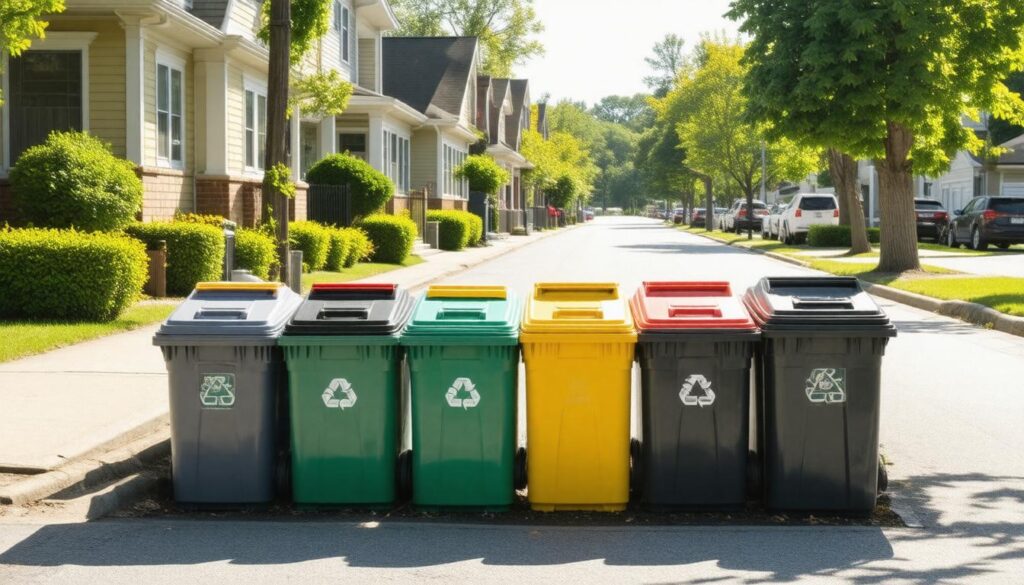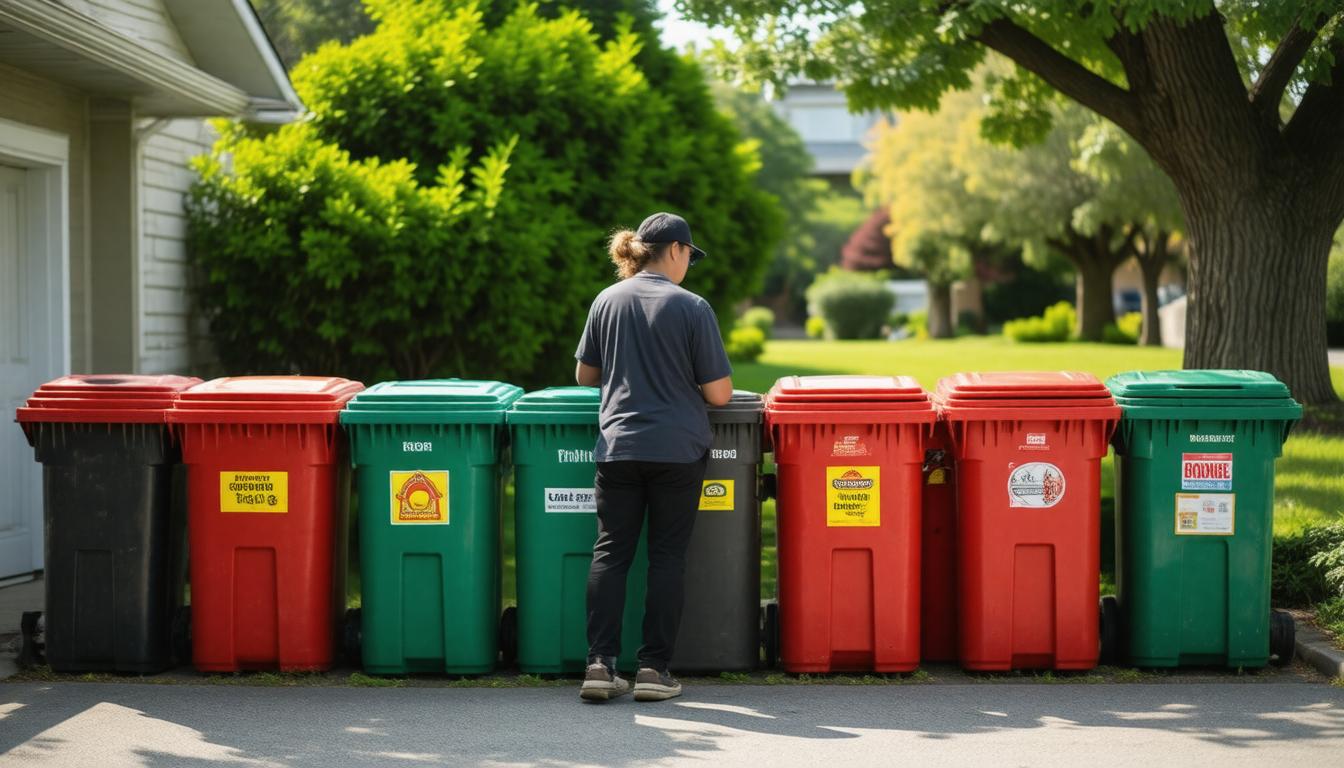When you think about keeping your home clean and tidy, curbside trash services might not be the first thing that comes to mind. However, they play a huge role in our daily lives, making waste management easier for families everywhere. Imagine not needing to worry about how or when to dispose of your garbage; that’s the beauty of having reliable curbside service! From piles of leftover food to broken appliances, these services whisk away our waste efficiently, taking a load off our minds—literally. By subscribing to a local provider like Tiger Sanitation, not only do we enjoy convenience, but we also contribute to a cleaner environment and healthier neighborhoods, all without breaking a sweat. So, let’s dive deeper into the importance of these services and what they offer!
Curbside trash services involve regular waste collection directly from residential properties, providing a convenient way for households to manage their waste. To access these services, you can subscribe through local waste management providers, such as Tiger Sanitation, which offers flexible options tailored to meet the needs of your community.
Introduction to Residential Trash Services
Residential trash services are a cornerstone of modern living, ensuring that our homes and neighborhoods remain tidy and healthy. This essential service involves the systematic removal of waste from homes at regular intervals, primarily designed to keep our communities clean and hygienic. Given that Americans generate approximately 4.4 pounds of waste per person every single day, the demand for efficient trash collection is more significant than ever.
Managing everyday waste can be daunting without reliable trash services. Households produce everything from food scraps and packaging materials to yard debris, all of which need proper disposal. This is where companies like Tiger Sanitation step in. Serving residents across South Central Texas—including San Antonio, San Marcos, and New Braunfels—Tiger Sanitation offers curbside garbage pickup as one of their core services. Each household typically receives a sturdy 95-gallon cart, which is not just convenient but crucial for managing the volume of waste produced.
As we see it, having a robust trash service is like having an invisible helping hand. It may seem basic, but its impact resonates deeply through communities, supporting both public health and environmental sustainability.
Furthermore, regular trash collection benefits residents beyond mere cleanliness. It significantly reduces pest problems by quickly eliminating trash that could attract rodents or insects. Moreover, reduced accumulation of waste decreases the risk of unpleasant odors that can linger in and around homes, fostering a more pleasant living environment. Families enjoy a cleaner home without constant worry about overflowing bins or attracting unwanted visitors—a win-win situation!
To help visualize how often these services are provided, here’s a brief overview:
| Element | Description |
|---|---|
| Service Frequency | Weekly for standard waste, bi-weekly for recyclables |
| Pickup Duration | Typically early mornings between 6 AM and 8 AM |
| Waste Carts Provided | Usually a 95-gallon cart, with additional carts as needed |
| Extra Services | Yard waste, bulk item pickup, recycling services |
Residential trash services play a vital role in maintaining not only the aesthetic appeal of neighborhoods but also the overall health and well-being of its residents. Herein lies the importance of understanding how effective waste management contributes to community infrastructure.
As we transition into discussing what types of materials these services handle, it’s important to consider how tailored approaches enhance efficiency in waste management systems.
Types of Waste Handled
Curbside trash services cover a variety of waste types to address different disposal needs effectively. One of the most prevalent categories is household waste, encompassing everyday items like food scraps, packaging materials, and other non-recyclable refuse. This type of waste is typically collected weekly and forms a significant portion of what residents generate. Having a reliable schedule for household waste collection keeps neighborhoods clean while preventing unpleasant odors and pest problems.
Recyclables
In an age where sustainability is key, it’s essential to educate ourselves about recyclables. Items like paper, cardboard, plastics, and glass should be sorted into designated recycling bins. Not only does this practice keep recyclables out of landfills, but it also significantly contributes to environmental conservation efforts by reducing the overall waste that enters these sites. When you sort correctly, you’re helping turn old materials into new products, thus playing a part in a healthier planet.
Yard Waste
Seasonal cleanups often produce significant amounts of yard waste, which includes leaves, branches, grass clippings, and other organic materials. Many curbside services provide specific containers for this type of waste that can be especially helpful in the fall or spring when yard work is at its peak. Regular pickups of yard waste mean homeowners can maintain neat gardens without cluttering public areas with debris—a win-win for both aesthetics and environment!
Bulk Items
Finally, let’s discuss those pesky bulk items like old furniture, mattresses, and appliances that can be cumbersome to dispose of properly. Many trash services, including Tiger Sanitation, accommodate these larger disposal needs through scheduled pickups for bulk items, ensuring that even the heaviest loads can be managed with ease. Knowing that you can get rid of these larger items responsibly provides peace of mind and keeps your living space clutter-free.
Recognizing the diversity of waste handled by curbside services serves as a foundation for understanding how regular pickups not only streamline waste management but also enhance community cleanliness and environmental stewardship. As we explore further, we can uncover the many benefits associated with consistent collection practices.
Advantages of Regular Collection
One of the most important advantages of regular collection is the promotion of hygiene and health within communities. By ensuring that waste is collected on a consistent schedule, residents can keep their neighborhoods clean and sanitary.
The visible presence of bins filled with junk and garbage not only creates an unpleasant view but also attracts pests like rats and insects, which thrive on the waste. A simple solution—regular garbage service—acts as a shield against these nuisances and protects our living spaces from unwanted visitors.
Health Benefits
According to the CDC, neighborhoods that benefit from timely waste removal have significantly lower risks related to pest infestations and disease outbreaks. A study revealed that areas featuring consistent trash pickups experienced 35% fewer rodent sightings compared to those without. This impressive reduction correlates directly to better public health, leading to fewer illnesses spread through contaminated food or debris.
Environmental Impact
Moreover, regular trash services lead to reduced litter accumulation while fostering recycling practices among households. With streamlined disposal methods in place, families are more likely to engage in sustainable behaviors, helping divert waste away from landfills. For instance, regions boasting robust curbside recycling programs have witnessed a 20% decrease in landfill waste over five years. This leads not only to cleaner neighborhoods but also positively impacts the environment by reducing pollution and conserving natural resources.
Convenience and Time-Saving
In our fast-paced world, convenience plays a crucial role. Regular curbside pickup eliminates the need for busy household members to worry about waste disposal—a significant time saver! Those hectic weekdays filled with errands and responsibilities leave little room for dealing with garbage transport. Instead, with a reliable service like Tiger Sanitation, residents enjoy peace of mind knowing that their waste will be taken care of efficiently.
An organized schedule fosters cleaner environments without the hassle of handling waste personally.
To fully maximize these benefits, understanding how to effectively manage waste containers becomes key to ensuring effortless disposal while contributing positively to the community.
Setting Up Your Waste Containers
To kick things off, it’s important to choose the right spot for your waste bins. Ideally, this means finding a location that meets two criteria: easy access for collection trucks and being out of the way of your daily activities. A flat, stable surface is particularly advantageous as it keeps the bins from tipping over during strong winds or heavy rains.
Think about where your driveway meets the street; that’s often the sweet spot for easy truck access without being obtrusive.
After establishing an ideal location, focusing on maintaining cleanliness makes a significant difference in how you manage waste.
Regular washing of your bins is crucial to keep unwanted odors and pests away. I recommend using a hose and a mild disinfectant every couple of weeks. This habit not only improves the smell of your outdoor area but also helps avoid drawing in critters that are attracted to food remnants.
A simple pressure washing can work wonders here, transforming the bins from unsightly fixtures into tidy assets. Staying on top of this maintenance prevents a buildup of grime, which can become increasingly harder to clean if neglected.
With clean bins in their designated spots, let’s discuss proper lid management for long-term success.
It’s vital to always keep those lids closed. Closed lids prevent pests from finding an open buffet, maintaining hygiene around your home, and also keeping rainwater out—nobody wants soggy cardboard piling up! Keeping everything contained ensures that your waste remains manageable and spills are minimized.
Using bungee cords or clips can help keep lids secure during windy days, preventing both mess and unpleasant surprises next time you go out to a pick-up.
Building on these practices, consider implementing effective separation of waste techniques.
Using different bins for recyclables, yard waste, and regular trash is more than just an organizational tip; it’s a responsible approach to waste management. For instance, placing green stickers on compost bins can help everyone in your household remember what can be thrown in there—a visual cue makes all the difference!
This easy sorting aids in efficient collection by ensuring recyclables end up where they belong, helping you do your part for the environment while simplifying disposal processes.
As you establish effective routines with your containers, you’ll find yourself better prepared for managing collection schedules seamlessly and optimizing bin usage moving forward.
Scheduling and Routine Tips
One of the best ways to ensure that waste doesn’t pile up around your home is to have an organized schedule. Knowing exactly when your trash will be collected keeps your routine tidy and helps you avoid frantic last-minute dashes to the curb with your bins. To maximize efficiency, it’s essential to understand key elements of good scheduling.
Key Scheduling Tips
- Know Your Collection Days: Establish your waste collection routine by marking these important days on your calendar—this includes garbage, recycling, and yard waste pickups. Having them noted prevents mix-ups or missed collections, ensuring nothing piles up and creates unnecessary clutter.
- Set Out the Night Before: One of my personal habits involves placing my bins at the curb the night before collection day. This small act significantly reduces stress on busy mornings. It also prepares you for any premature morning surprises like rain! You’ll wake up ready without worry—a great way to start the day.
- Handle Bulk Items Separately: If you have large items for disposal, make sure you schedule these pickups ahead of time. Handling bulk item removals separately can avoid confusion during regular collection days, allowing for a smoother pickup experience. You wouldn’t want to end up with a sofa blocking the sidewalk because you forgot to make an appointment for its removal!
Effective Routines
Creating a weekly routine can significantly enhance how efficiently you manage your household waste. Inviting everyone in the home to participate not only shares responsibility but also fosters a sense of teamwork. Involving children in sorting recyclables teaches them valuable lessons about sustainability while lightening your load.
By establishing clear roles, such as who sorts paper versus who takes out kitchen trash, you’ll find maintaining this system becomes second nature over time.
Keep in mind that routines work best when they remain flexible yet consistent; some weeks may require more attention than others based on holiday schedules or special events. Even having designated “cleanup” evenings can transform waste management into an engaging family activity.
Understanding these scheduling practices allows for better financial management, providing insight into the different pricing structures linked to residential waste services that we’ll explore next.
Costs and Service Alternatives

Let’s explore the financial aspects of curbside trash services. Knowing what to expect when it comes to costs allows you to budget effectively while selecting a plan tailored to your household’s needs. On average, residential trash collection typically falls within a range of $20 to $60 per month. This variation depends on several factors including geographic location, service frequency, and any additional features like bulk item pickups or extra waste carts for larger families. It’s important to compare options not just for their price but also for the value they provide in terms of convenience and reliability.
Typical Costs Overview
Many people don’t realize how much waste Americans generate—approximately 4.4 pounds of waste per person daily. That definitely adds up over time! When you’re budgeting, keep in mind that costs can increase if you require more frequent pickups or have specific needs like disposing of oversized items, which some providers may charge separately for.
Now that we have a clear grasp of typical costs, let’s explore the different service models available.
Comparing Service Models
There are primarily two models to consider when selecting trash services: subscription models and pay-per-pickup services. Subscription-based systems provide a predictable monthly fee regardless of how much waste you produce, allowing for smooth budgeting. Conversely, pay-per-pickup systems can be beneficial for smaller households or individuals who generate less waste; this way, they only pay when they need disposal services. This flexibility means that if you find yourself regularly accumulating more than expected, a subscription might offer better long-term savings.
If you’re looking for more choices beyond traditional providers, exploring alternative options may help you find what suits your family best.
Alternatives to Municipal Services
In some areas, private waste management companies present highly customizable plans that can cater specifically to your needs. These plans often include flexible schedules and varied pickup options designed around your lifestyle. Additionally, communities sometimes operate co-op services where neighbors join forces to share costs and benefit from collective bargaining—this can lead to lower fees and more tailored services without sacrificing quality.
Understanding the costs associated with curbside trash services sets the stage for better budgeting and empowers you to choose the right service model that aligns with your household’s unique needs. The next step involves evaluating prospective providers to optimize your home’s waste management system effectively.
With a comprehensive understanding of these aspects in place, it’s now important to consider the options available to connect with a provider that meets all your needs.
Selecting the Best Provider
Choosing the right trash service provider can significantly impact your overall experience with waste management, and it starts with understanding what features matter most. One of the first aspects you should examine is reputation. Look for companies with strong reviews and testimonials from customers. For example, local favorites like Tiger Sanitation have established themselves as a reliable choice in South Central Texas. They’ve earned trust not only by providing consistent service but also by accommodating the specific needs of their communities.
As you assess potential providers, consider these critical factors:
- Range of Services: Your chosen provider should offer a full suite of waste management services. This includes curbside garbage pickup, recycling, and bulk item removal to manage various types of waste, from ordinary trash to yard debris.
- Pricing: When comparing prices among different providers, consider hidden fees or contract terms that might increase your costs later on. Some companies may appear cheaper upfront but include additional charges for recycling or special pickups.
- Environmental Commitment: Look for providers that prioritize sustainable practices. Companies like Tiger Sanitation promote recycling and actively work to reduce landfill waste, positively impacting community health.
Once you’ve narrowed down your options based on these essential criteria, seeking out testimonials can further inform your choice.
Just take one customer’s experience with Tiger Sanitation as an example: “Their timely pickups and attention to recycling have made managing our household waste hassle-free. Plus, their commitment to sustainability aligns with our values.” Real-life experiences like this offer genuine insight into how a trash service operates on a day-to-day basis.
Ultimately, the best provider will meet your immediate garbage collection needs while promoting a cleaner, healthier community through their proactive approach to waste management. By focusing on factors like reputation, range of services, pricing structures, and environmental commitments, you can make a well-informed decision that serves your household effectively while benefiting the greater community.



